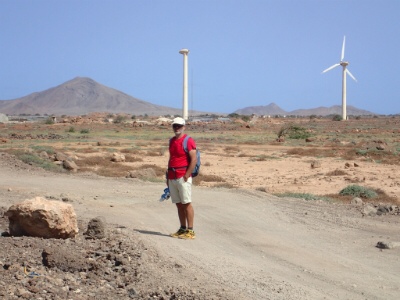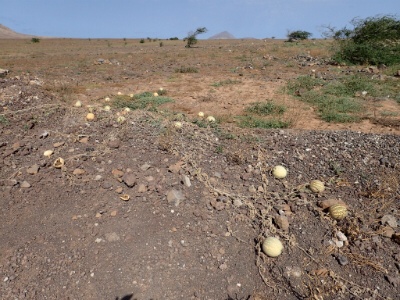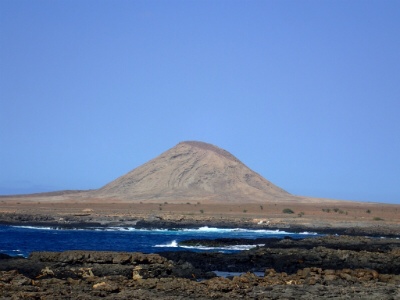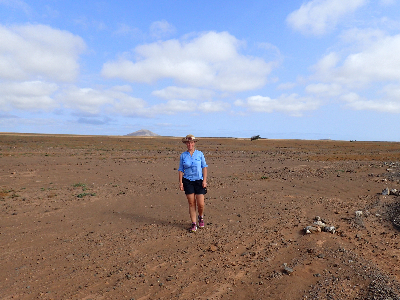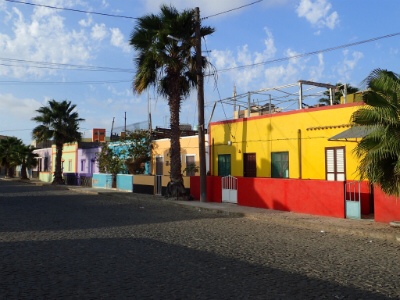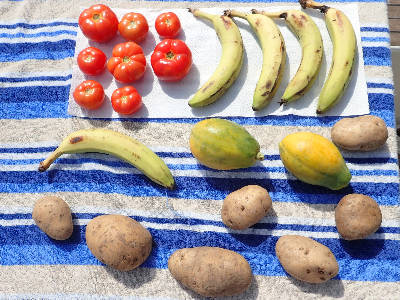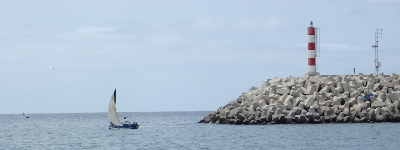Sal ('salt' in portuguese)

Caramor - sailing around the world
Franco Ferrero / Kath Mcnulty
Wed 11 Feb 2015 00:40
The direction we were planning to head in (would have been a good idea in hindsight)
Jonpi describes himself as 'smoked-Irish' because he has been in hot climates for a long time. He spends his life cruising the Atlantic, he overwinters in the Canaries, in Pasito Blanco of all places (I do remember seeing his boat in the yard), then on to Cape Verde before crossing the Atlantic to Grenada and other Caribbean islands, returning via the Azores. He still speaks English, but only just, and with an odd Irish-Spanish accent. He's interested in the people he has met, not the palm trees and over the years has become a sort of atlantic postman, delivering items between family members living in different islands and countries.
Jonpi's dinghy outboard engine cut out as he was nearing Caramor, we invited him to tie up alongside to fix it. He declined and got his tiny oars out but despite his efforts he was being swept out of the bay, he ended up lying on his belly and using one of the oars to paddle back up to Caramor. His engine was soon repaired and off he went.
Later we met him in town and went for a drink, he's been coming here every year for the past twenty so knows the place well. He told us that the best walk on Sal was to head north round the harbour and then on up the coast to some lagoons where we could swim.
The last time we bathed in the sea was in La Palma, ages ago. I could tell Franco was really looking forward to a dip in the lagoons as we packed our swimming costumes. We paddled ashore, half deflated Ding-the dinghy (so that she doesn't burst her seams as she expands in the heat) and found a side street which bypasses the harbour. The dirt road took us through the town rubbish dump where all the local dogs hang out, then through the half-abandoned and semi-derelict industrial zone and into the desert. Every few yards was a heap of stone or gravel, the whole place felt like a rubbish tip.
Franco in front of the mothballed wind turbines, looking back towards Palmeira
It is hard to imagine how this island can sustain any population at all, without desalination plants life here would be impossible.
Against all odds, a particular type of non-edible melon grows in the disturbed soil of the track
The island is dotted with mountains just like this one
Eventually after 5km along a very dusty track we arrived at a large building looking out over the sea. It was a restaurant and entirely devoid of customers, a man in a red t-shirt and baggy tracksuit bottoms appeared and told us he was open for business. A few cars were parked nearby and people were bronzing on the rocks above a sea gully protected from the swell by a rocky shelf, with only the largest waves making it into the pool. The rocks looked similar to those of the Giant's Causeway in Ireland. The water wasn't very inviting, too much green algae so we decided to go for a drink instead. The restaurant was large, surrounded by netting to cut the wind and the dust and filled with twenty tables or more. The menu seemed to consist of several variations of 'hamburger' though food didn't appear to be available. Mr Redshirt, a sullen sort of guy, brought us two bottles of coca-cola. We asked him why it was so quiet, he said it was Sunday, he told us that the quiet tourist season was in the spring and that summer in the Cape Verde is very hot. We spoke in french. He then said: "There are bandits on this road, you shouldn't have walked here." "Bandits?" I asked. Last Friday night he was attacked by four masked men wielding a gun. He told us that this kind of crime hadn't happened on Sal for the past three years. We asked if he had called the police "they don't come anyway". He gave us some good advice: "if a vehicle stops and they call you over, walk the other way".
We paid for our drinks: double the cost in town - daylight robbery!
A desert landscape
Back in town, the streets were lively, several cafés and houses were playing loud music; reggae, west African, pop. The people here are very urban, they dress stylishly and their hair is often plaited into intricate designs, appearances matter, even here in this tiny town on this tiny island. The countryside hasn't much to offer.
Colourful houses in Palmeira
Dozens of dogs hang out, a white three-legged shaggy dog is particularly friendly, he has a nice way of coming up to you, tail wagging, bright eyed, expectant at the same time. Other dogs will nibble his fleas for him, without a front paw there are some places you just can't reach.
A dog chased a cat, the cat jumped up a wall .... ssssccccrrrape, it fell back down. (I shut my eyes, dreading the carnage.) A stand off. The cat leapt onto the dog's head and got away! I laughed at the dog who jumped up at me, embarrassed.
From pooch to hootch: cane sugar grows on some of the islands, it is distilled to make a local rum which is sweetened with palm honey (palm sap) and called 'punch'. The punch tastes good but we have been advised to avoid the 'grog' (we didn't ask why).
Cape Verde is doing all-right, the standard of living is the highest in Africa and the government has been stable for a long time with sound economic policies. Money sent by Cape Verdeans abroad and foreign aid are the main sources of income with European countries subsidising different islands. Eighty percent of food is imported to Cape Verde, in the case of Sal, I doubt anything grows here so everything must be brought in, even if from neighbouring islands. There are no cake shops, no cakes in shops, the diet is mostly bean stew and fish with a limited selection of fruit. Very few people are overweight, most look fit, healthy and strong. The children play outside all day; football, hopscotch, skipping, handstands, they never stop moving. The scourge of obesity is unknown here.
Reading sailing stories before setting off I was determined that cockroaches wouldn't happen in my galley. Having now dealt with two outbreaks of weevils and a close shave (I hope) with a cockroach (I think - i.d. was tricky after it met my sandal), I am taking sanitary precautions very seriously. No cardboard onboard and fruit and veg are washed in a mild bleach solution before being allowed into the cabin
Drying the shopping
Water is a big concern on Sal, we can buy desalinated water with a very strong bleach smell for 1 escudo (=0.01 Euro) a litre from the town fountain or from a café by the shore. I have always valued water, even more so now that I have to row ashore each time I want to fill my bottles. The water in our tank is from El Hierro and palatable, we will savour every drop.
Finally, the idea of flying fish has always seemed very exotic, I was looking forward to meeting our first and expected to see some by the time we arrived in Cape Verde. Every morning on our crossing we would check the rigging and generally walk round the deck - no flying fish. As we dropped anchor I noticed a small limp body with beautiful delicate wings lying by the anchor windlass - our first flying fish (sadly dead).
A fisherman sailing out of harbour - an unusual sight
Kath

